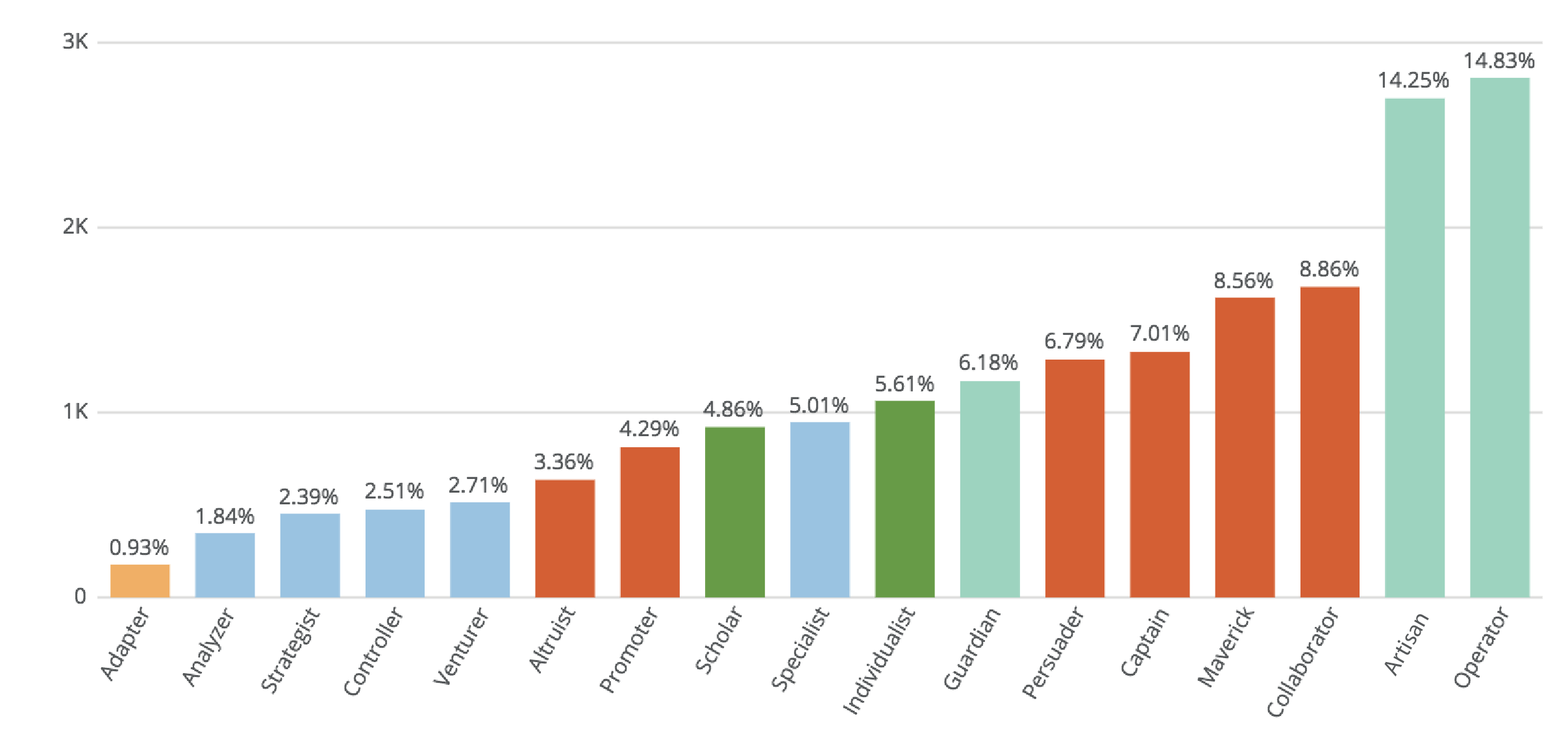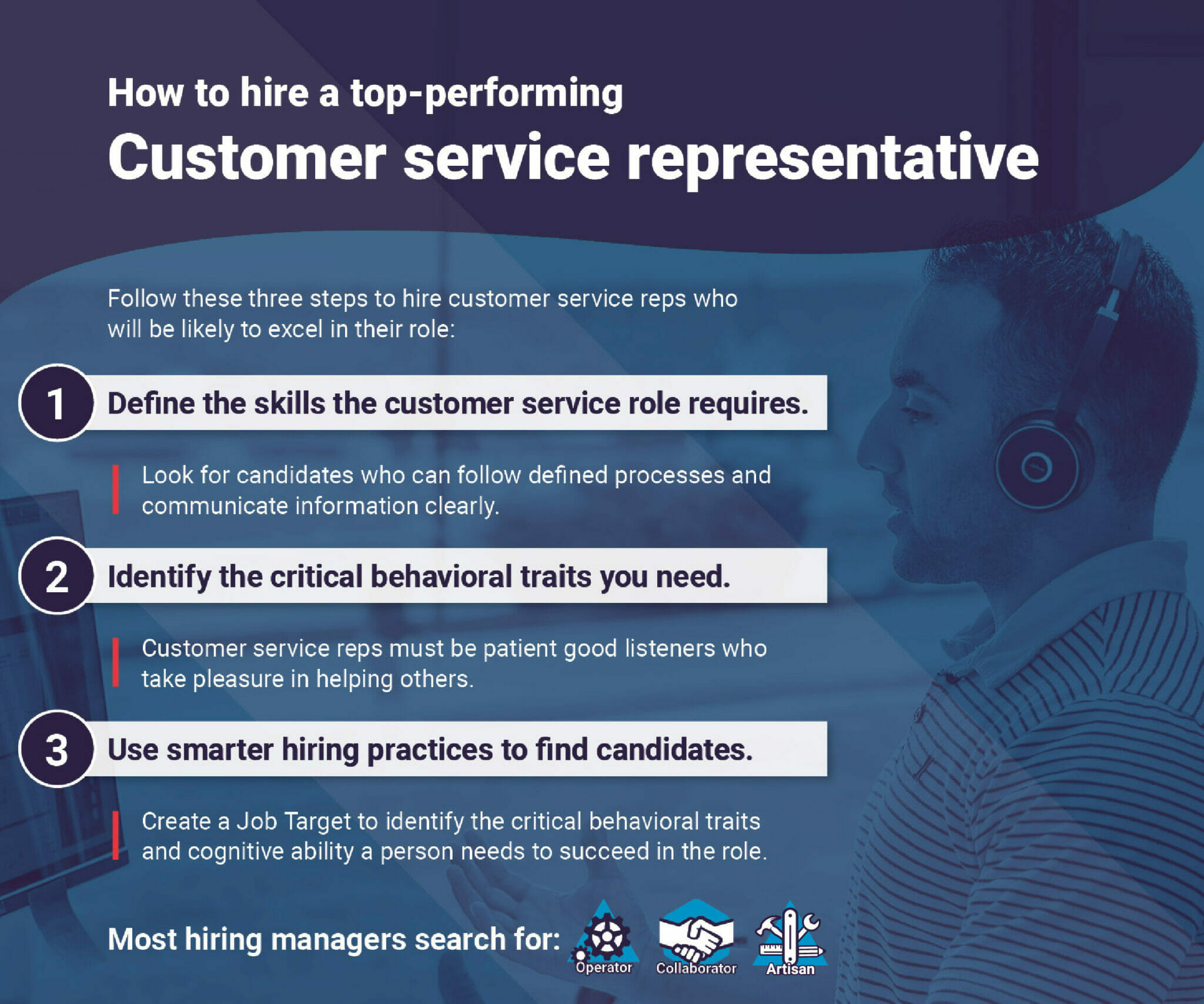Offering great customer service is a huge competitive advantage. After a positive interaction, people become loyal to your brand—and they refer you to their friends because they trust you’ll do right by them, too. On the flip side, one negative interaction can cost you someone’s business forever. With so much at stake, you can’t afford to hire customer service representatives who are anything less than the best.
Customer service agents must have strong communication skills, an affinity for solving problems, and a temperament that doesn’t wither under pressure and stress. If you have any chance of meeting your business goals, you need to have the right people in place.
The problem with hiring for this entry-level role is that many candidates don’t have a long work history. Some might be fresh out of college. And while you can get a feel for someone’s personality during the interview, it’s difficult to know if they’d be resilient enough to withstand frequent interactions with aggressive customers.
Your gut isn’t a good predictor of on-the-job success: Candidates might be well-mannered during the interview, but remember—people are on their best behavior when they want to land a job. If you hire based on your gut feel, you have no real idea whether someone has what it takes to remain cool under pressure. Can this candidate de-escalate an angry customer? It’s hard to say.
A bad hire drains the coffers: Thanks to mass attrition, 75% executives have incurred significant financial losses in the past year. For full-time customer service reps earning $15 an hour, employers can expect to lose at least $9,000 per bad hire. So in an industry that already suffers from higher-than-average turnover rates (26 percent vs. 15 percent), maintaining status quo just isn’t an option.

So how can you hire customer service reps who are likely to excel in their roles? Here are four steps to help you find the right people for your open roles:
1. Define the skills the customer service representative role requires.
Customer service reps don’t have a ton of variation in their day-to-day duties. Common tasks include answering questions, solving problems, and educating customers on available programs, services, or promotions. In terms of raw skills, customer service reps must be able to:
- Speak confidently in person/on the phone.
- Communicate well via email/live chat.
- Follow scripts and established processes.
- Quickly identify appropriate answers and solutions.
- Use a computer to look up information.
- Gather information to escalate up the chain as necessary.
Besides these baseline skills, you might also identify other must-have skills. Do you need your customer support reps to assist with sales by asking customers if they’d like to upgrade? Should they be able to complete administrative tasks like scanning documents? Do they need to be bilingual? Get it all down on paper and ensure you and your hiring team are in agreement.
2. Identify the critical behavioral traits you need.
While skills can be taught, people’s innate behavioral drives don’t change much over time. This is why you have to identify the behavioral traits someone needs to be successful in the role. You can use this list as a barometer when judging candidate fit (more on that later).
Most teams look for candidates who are:
- Patient
- Collaborative
- Conscientious
- Process-oriented
- Resilient
- Analytical
At The Predictive Index®, we recommend that hiring managers create a Job Target. This is the best way to ensure you understand the critical behavioral traits and cognitive abilities a person needs to be successful in the role. Job Targets are key when it comes time to assess candidates as you’ll compare each of them to this benchmark.
3. Use smarter hiring processes to find candidates.
As we mentioned earlier, choosing the wrong candidate is costly. The good news is that employee turnover costs are avoidable. When you use smart hiring practices, you increase your ability to predict on-the-job success, and this means you make fewer bad hires. After you’ve identified the key skills and behavioral traits, ask all candidates to complete a behavioral assessment and a cognitive assessment as part of the initial application. Then you can see if they match your Job Target.
Our scientifically-validated PI Behavioral Assessment™ pinpoints people’s natural behavioral drives. After someone finishes the assessment, we assign them a Reference Profile. We have 17 Reference Profiles. These help us understand what makes someone tick, and they also help ensure job fit.
The PI Cognitive Assessment™ is the second piece of the puzzle. It measures a person’s ability to learn new concepts. Some roles will require a higher cognitive score than others. It’s crucial that you hire someone with a cognitive score that falls in the range you set in your Job Target. Cognitive assessments are excellent predictors of how well someone will perform in the role. They complement the behavioral assessment to take the guesswork out of hiring.
Simply compare your candidates’ Reference Profiles and cognitive scores to your Job Target. This gives you a shortlist of people who are likely to be a good fit.
Smart hiring helps weed through your resumes and results in a better candidate pool. After determining initial job fit, then you can look for who has the needed customer service skills.
4. Address (and remove) hiring biases.
Even when managers try their best to remain impartial, unconscious bias still finds its way into our hiring decisions. Behavioral and cognitive assessments help remove subjectivity from the equation. By leveraging objective science, you level the playing field for candidates and advocate for a more inclusive and diverse workplace.
Smart hiring takes smart tools. Equip yourself with a variety of data points—from cover letters and referrals, to behavioral and cognitive data—to ensure as objective a process as possible. Beyond that, it’s important to keep the right frame of mind. You’re not hiring a name on a list; you’re hiring a person. Make sure you’re considering the “whole” person, and hiring based on their head, heart, and briefcase.
Sample interview questions to ask a customer service rep candidate
Here are some interview questions to help you narrow down your search for the ideal customer service rep:
- Can you discuss a time when you worked with a customer to troubleshoot a problem?
- Tell me about a time when you had to adopt a new process or system. What were the challenges and learnings?
- What was the best team you ever worked on? What were the drivers of success?
- What does excellent customer service look like to you?
By incorporating behavioral questions into your interview process, you ensure you’re asking the right questions for the job posting—and up the odds of landing your ideal new hire.
3 most common Reference Profiles for customer service representatives
Employers have created about one million Job Targets in our system over time. When we look at the Job Targets 19,000 different people set for the customer service role, we see that three Reference Profiles show up time after time.

These are the three most common Reference Profiles employers look for when hiring customer service reps:
1. Operator
Operators are patient, conscientious, and cooperative team workers. With a relaxed nature, there’s not much that can ruffle an Operator’s feathers—even angry, aggressive customers usually won’t get them down. They’re focused on how to get things done right, which can be very reassuring for upset customers. Operators like to do a thorough job, which means they’ll be happy to follow set processes like documenting interactions in a CRM.
2. Artisan
An Artisan is an excellent team player who quietly and efficiently gets the job done. They tend to be on the quiet side, which means they’d rather listen than talk. Their great listening skills are an asset in the customer service role. The understanding Artisan anticipates problems and takes an analytical approach to solving problems. They are in the Stabilizing group of Reference Profiles—this is who you want on the other side of the phone to de-escalate upset customers.
3. Collaborator
Collaborators thrive as part of a team due to their cooperative nature. They’re skilled listeners who are people-oriented and patient. They also tend to be empathetic, which can endear them to customers and also allows them to provide an excellent customer experience. Finally, Collaborators are patient with routines and won’t mind following your defined processes.
Join 10,000 companies solving the most complex people problems with PI.
Hire the right people, inspire their best work, design dream teams, and sustain engagement for the long haul.
How to attract top-performing customer service reps
Here are some tips for attracting Operators, Artisans, and Collaborators:
Use the right channels.
Sites like Monster, Indeed, CareerBuilder, and ZipRecruiter are a good bet for all three Reference Profiles because of the position’s entry-level nature. Employees who are just beginning their professional careers might not yet be active on LinkedIn or other professional networking websites. If you tend to have success with new grads, be present at on-campus job fairs in your area and don’t discount community colleges.
Craft the right job listings.
Operators and Artisans are Stabilizing profiles that are thorough and analytical. This means they will do lots of research in determining whether a job—and a company—is a good fit for their needs. Be sure to write detailed job descriptions. Social Collaborators will care about company culture so play it up in your posting. And make sure your Glassdoor is up to date.
Here are some bullet points you can copy and paste:
Key responsibilities:
- Answer customer questions via inbound phone calls and chats
- Dispatch technicians to customers’ homes
- Ensure that problems are solved and customer needs are met
- Resolve problems independently, but escalate as needed
- Complete and file work orders
- Educate customers on services, programs, and promotions
- Maintain call logs and keep CRM records up to date
Desired skills and experience:
- Associate degree or equivalent work experience
- Previous customer service experience preferred
- Bilingual in English and Spanish
- Excellent verbal and written communication skills
- Computer-savvy and able to use multiple computer programs simultaneously
- Strong time-management and organizational skills
- Be a solution-oriented great listener and remain calm under pressure

Make the right job pitch.
Does your company have a clear path for how entry-level customer service employees can work their way up into leadership roles? Do you have amazing perks like flexible working hours or the ability to work from home? Is there the ability to earn commissions or bonuses? Too often, customer service is looked down upon as a dead-end job that’s marred by stress. But if your company is changing that old and depressing definition, sing your praises unabashedly.
Onboard them with purpose.
When you hire entry-level employees, you need a strong onboarding program. Ask about their professional goals and find ways to help them reach small milestones early on to get the momentum going. You might consider asking Operators and Artisans to take note of any processes that seem inefficient as they’re ramping up. These Reference Profiles thrive on analyzing and fixing problems, and this will help them feel valuable. To ensure a positive experience for Collaborators, consider assigning them an onboarding buddy.
How The Predictive Index helps companies hire top performing customer service reps
PI Hire takes the complexities of hiring and makes the process intuitive and scalable. Use PI to align with keys stakeholder on your ideal job title and requirements. Create a “Job Target” in the software, then post an accompanying job listing online, and you’re off to the races.
As job seekers start to apply, PI will assess their fit based on two crucial areas of pre-employment testing: behavioral makeup and cognitive ability. As results come in, you’ll see how candidates rank against one another based on the Job Target benchmarks you set. Not only will this help you prioritize the best candidates for an interview, but it will save you time and hassle while doing so.
Once it’s time to interview, PI equips you with custom questions designed to assess a candidate’s behavioral fit for the role. Use this opportunity to confirm what looks like a behavioral match, or to probe for potential problem areas. Either way, PI helps you cut down on subjective bias, by putting the emphasis on objective people data.
Hiring top talent isn’t a question of finding a “unicorn” candidate. Good customer service can be found anywhere—so long as you know where to look. By putting less emphasis on years of experience or hard skills, and considering elements such as behavioral fit, cultural fit, and lived experiences, you increase the odds of finding your next best customer service rep. And PI’s there to help you make it happen.
Hiring isn’t something you can guess on. Rely on data to make better hiring decisions.
Try our free Job Benchmarking Calculator to discover the most common Reference Profiles for any position in your company.
FAQ
Why hire a customer service representative?
- Scale up the size and capabilities of your customer service team.
- Add an experienced support member to help drive customer satisfaction and retention.
- Increase your team’s ability to answer questions and provide 1-on-1 time with customers.
- Provide more-detailed and better-researched answers to customer inquiries.
- Support new customers as they familiarize themselves with your products or services.
What are the types/variations of the customer service representative position?
Other common names for the customer service rep position include:
- Customer service professional
- Customer support representative
- Software support representative
- User operations specialist
What skills or experience make for an ideal customer service representative?
The ideal skill set for a customer support rep will depend heavily on your industry, and the products or services you offer. That said, here are some general traits you might find valuable to look for:
- Maintains a positive attitude
- Has exceptional emotional intelligence
- Enjoys collaborating with team members
- Efficient at troubleshooting and problem-solving
- Has experience working at a call center or help desk


